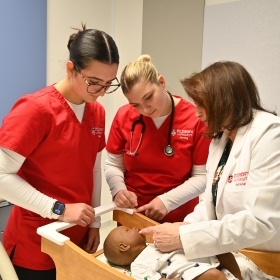Letters of Recommendation: Do They Make a Difference?

In the ever-evolving landscape of college admission, students often wonder which components of their application hold the most weight. Essays, test scores, and interviews are common focal points, but what about letters of recommendation? Once considered a pivotal aspect of the admission process, do they still carry the same influence?
In this post, we explore the true impact of letters of recommendation in the undergraduate and graduate application process and provide insights on making the most of this critical piece of your application.
What Are Letters of Recommendation?
At their core, letters of recommendation are endorsements written by teachers, professors, advisors, coaches, supervisors, or professional mentors who can speak to your character, academic abilities, and potential. They offer admission committees a valuable outside perspective on your strengths and qualifications, enhancing the credibility of your application and highlighting your unique abilities.
Undergraduate vs. Graduate Letters of Recommendation
I. Undergraduate Letters of Recommendation
For undergraduate admission, letters of recommendation typically come from high school teachers, guidance counselors, or mentors who can speak to your academic performance, personal qualities, and extracurricular involvement.
According to Kerri Darcy, Executive Director of Undergraduate Admission and Recruitment at St. John’s University, a teacher’s letter is particularly valuable because it “offers unique insight into your academic abilities, work ethic, and how you engage with the material in a learning environment.” She emphasizes that a letter from a teacher who has seen you excel in a subject related to your intended major can be incredibly impactful."
These letters often emphasize
Social Engagement
Extracurricular activities and volunteer work are usually more prominent in undergraduate letters, showing how you’ve contributed to your school or community beyond academics.
Academic Potential
Teachers may focus on how you’ve excelled in their courses, demonstrated a willingness to learn, and shown potential for success in college.
Personal Character
Counselors and mentors often highlight your leadership skills, work ethic, and ability to work well with peers, giving admission committees a well-rounded view of your character.
II. Graduate Letters of Recommendation
On the other hand, graduate programs expect letters that emphasize your readiness for advanced study and research potential.
Amber J. Steiger, Director of Graduate Admission at St. John’s University, notes that "these letters provide the admission committee with additional insight into a candidate’s character, work ethic, and academic drive.” Strong letters can sometimes push an applicant from a “maybe” to an “accept,” particularly when they highlight academic or professional achievements that align with the program."
These letters often emphasize
Research and Analytical Skills
Graduate programs, particularly in research-heavy fields, seek strong evidence of critical thinking, problem solving, and research experience.
Professional and Academic Achievements
If you’ve worked in a professional setting or conducted research, supervisors or professors can discuss your contributions and responsibilities in these areas.
Focus on Specialized Skills
Graduate letters often explore specific academic or technical skills relevant to your field, highlighting your ability to contribute meaningfully to the program.
How Much Weight Do Letters of Recommendation Carry in Admission?
The impact of recommendation letters varies depending on the type of program to which you are applying. For undergraduate programs, letters are often just one piece of a larger puzzle. Still, they can make a significant difference, especially for students applying to highly competitive programs or those on the cusp of meeting admission requirements.
Ms. Darcy explains that at institutions like St. John’s, “which emphasizes a holistic review, letters of recommendation can play a significant role when applying as an undergraduate student,” particularly when academic credentials don’t tell the whole story.
Ms. Steiger highlights that “letters of recommendation are important for graduate programs because they provide the admission committee with additional insight into a candidate’s work or volunteer experience,” which may even compensate for lower academic metrics.
What Makes a Strong Letter of Recommendation?
Not all letters of recommendation are created equal. So, how can you ensure yours stand out?
Ms. Steiger advises, “I recommend candidates focus on selecting a reference who knows them well, as a personal letter provides more value than one coming from a reference with an impressive title who submits a generic letter." A letter that is tailored to your unique experiences and achievements is far more impactful.
Ms. Darcy emphasizes the importance of honesty and balance: “While the letter should be positive, it should also be honest. Acknowledging areas of improvement or challenges the student has faced, and how they’ve worked to overcome them, adds depth and authenticity.” This approach offers admissions committees a well-rounded and realistic view of your potential.
Common Misconceptions about Letters of Recommendation
A few widespread misconceptions about letters of recommendation can hinder applicants. One common belief is that the prestige of the letter writer matters more than their connection to the student. While having a letter from a renowned professor or leader in your field may seem impressive, Ms. Darcy and Ms. Steiger stress that depth of knowledge and personal insight carry more weight. A generic letter from someone who barely knows you won’t carry much weight, even if they hold a prestigious title.
Another misconception is that letters must always come from academic sources. Ms. Steiger points out that at St. John’s, “we accept academic or professional references,” which provides flexibility for applicants who have been out of school for some time. These references can come from various professional mentors, including those outside academia.
Alternatives to Letters of Recommendation (When Applicable)
Some programs are beginning to place less emphasis on letters of recommendation or may not require them. In such cases, applicants can strengthen their profiles through other means, such as statements of purpose, portfolios, or interviews. These components offer a different way for students to showcase their skills, but it’s essential to understand the role letters of recommendation still play for many programs.
The Lasting Power of a Strong Recommendation
Letters of recommendation remain a valuable component of the admission process, particularly for students applying to competitive undergraduate programs or research-focused graduate programs. These letters offer a personal touch that other application materials can’t, giving admission committees a well-rounded picture of your potential.
As a prospective student, building solid relationships with your teachers, professors, or mentors is essential so that when the time comes, you can ask for a recommendation that genuinely reflects your abilities and character. Approach this part of your application with the same care and thoughtfulness you give to your essays or interviews—because, as Ms. Steiger confirms, “a stellar letter of recommendation can push an applicant from a ‘maybe’ to an ‘accept.’”

Get Personalized Guidance
If you have any questions about letters of recommendation while applying to St. John’s University, contact Kerri Darcy, Executive Director of Undergraduate Admission and Recruitment, or Amber J. Steiger, Director of Graduate Admission, for guidance and support.







